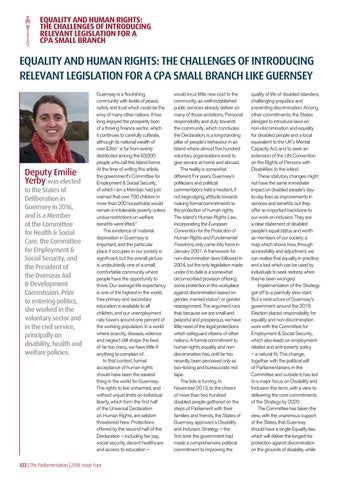EQUALITY AND HUMAN RIGHTS: THE CHALLENGES OF INTRODUCING RELEVANT LEGISLATION FOR A CPA SMALL BRANCH
EQUALITY AND HUMAN RIGHTS: THE CHALLENGES OF INTRODUCING RELEVANT LEGISLATION FOR A CPA SMALL BRANCH LIKE GUERNSEY
Deputy Emilie Yerby was elected
to the States of Deliberation in Guernsey in 2016, and is a Member of the Committee for Health & Social Care, the Committee for Employment & Social Security, and the President of the Overseas Aid & Development Commission. Prior to entering politics, she worked in the voluntary sector and in the civil service, principally on disability, health and welfare policies.
Guernsey is a flourishing community with levels of peace, safety and trust which could be the envy of many other nations. It has long enjoyed the prosperity born of a thriving finance sector, which it continues to carefully cultivate, although its national wealth of over £3bn1 is far from evenly distributed among the 63,000 people who call this Island home. At the time of writing this article, the government’s Committee for Employment & Social Security, of which I am a Member, had just warned that over 700 children in more than 200 households would remain in intolerable poverty unless undue restrictions on welfare benefits were lifted.2 The existence of material deprivation in Guernsey is important, and the particular place it occupies in our society is significant, but the overall picture is undoubtedly one of a small, comfortable community where people have the opportunity to thrive. Our average life expectancy is one of the highest in the world, free primary and secondary education is available to all children, and our unemployment rate hovers around one percent of the working population. In a world where scarcity, disease, violence and neglect still shape the lives of far too many, we have little if anything to complain of. In that context, formal acceptance of human rights should have been the easiest thing in the world for Guernsey. The rights to live unharmed, and without unjust limits on individual liberty, which form the first half of the Universal Declaration on Human Rights, are seldom threatened here. Protections offered by the second half of the Declaration – including fair pay, social security, decent healthcare and access to education –
322 | The Parliamentarian | 2018: Issue Four
would incur little new cost to the community, as well-established public services already deliver on many of those ambitions. Personal responsibility and duty towards the community, which concludes the Declaration, is a longstanding pillar of people’s behaviour in an Island where almost five hundred voluntary organisations exist to give service at home and abroad. The reality is somewhat different. For years, Guernsey’s politicians and political commentators held a hesitant, if not begrudging, attitude towards making formal commitments to the protection of human rights. The island’s Human Rights Law, incorporating the European Convention for the Protection of Human Rights and Fundamental Freedoms, only came into force in January 2001. A framework for non-discrimination laws followed in 2004, but the only legislation made under it to date is a somewhat circumscribed provision offering some protection in the workplace against discrimination based on gender, married status3, or gender reassignment. The argument runs that, because we are small and peaceful and prosperous, we have little need of the legal protections which safeguard citizens of other nations. A formal commitment to human rights, equality and nondiscrimination has, until far too recently, been perceived only as box-ticking and bureaucratic red tape. The tide is turning. In November 2013, to the cheers of more than two hundred disabled people gathered on the steps of Parliament with their families and friends, the States of Guernsey approved a Disability and Inclusion Strategy – the first time the government had made a comprehensive political commitment to improving the
quality of life of disabled islanders, challenging prejudice and preventing discrimination. Among other commitments, the States pledged to introduce laws on non-discrimination and equality for disabled people and a local equivalent to the UK’s Mental Capacity Act, and to seek an extension of the UN Convention on the Rights of Persons with Disabilities to the island. These statutory changes might not have the same immediate impact on disabled people’s dayto-day lives as improvements in services and benefits, but they offer an important backbone to our work on inclusion. They are a clear statement of disabled people’s equal status and worth as members of our society; a map which shows how, through accessibility and adjustment, we can realise that equality in practice; and a tool which can be used by individuals to seek redress when they’ve been wronged. Implementation of the Strategy got off to a painfully slow start. But a restructure of Guernsey’s government around the 2016 Election placed responsibility for equality and non-discrimination work with the Committee for Employment & Social Security, which also leads on employmentrelated and anti-poverty policy – a natural fit. This change, together with the political will of Parliamentarians in the Committee and outside it, has led to a major focus on Disability and Inclusion this term, with a view to delivering the core commitments of the Strategy by 2020. The Committee has taken the view, with the unanimous support of the States, that Guernsey should have a single Equality law, which will deliver the longed-for protection against discrimination on the grounds of disability, while
